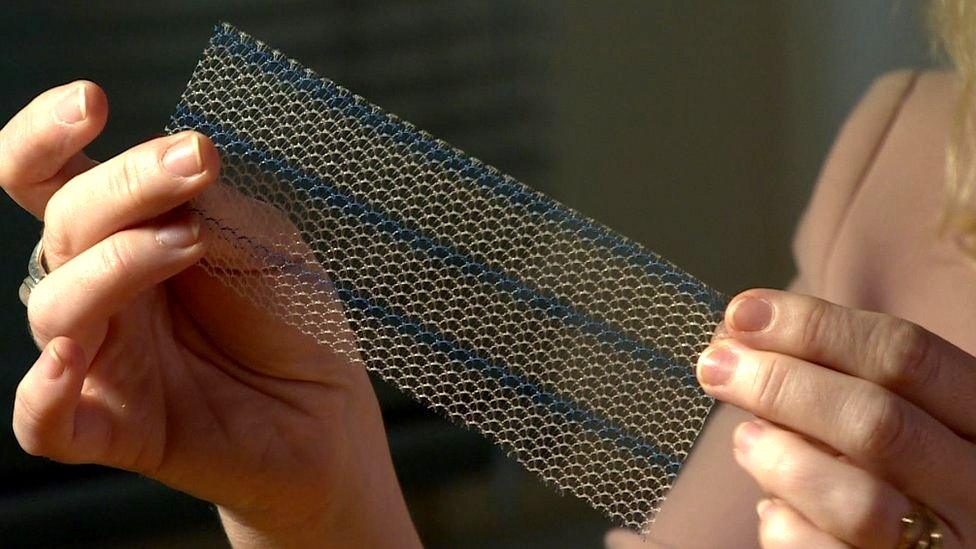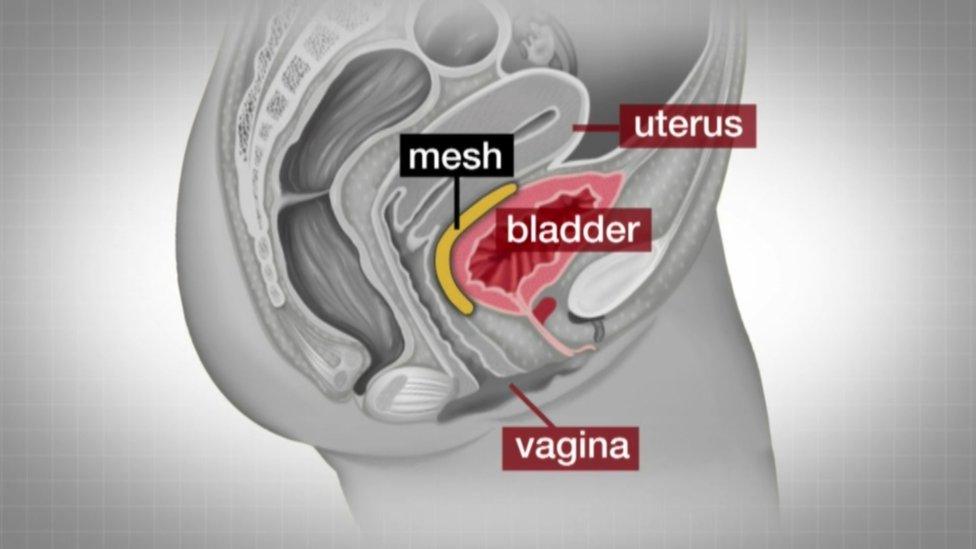Scottish mesh patients can have corrective surgery in US and England
- Published

The synthetic implants are very difficult to remove after they have been fitted
Women who require the surgical removal of mesh implants will be able to receive free treatment from specialists in America and England.
The Scottish government announced it had awarded contracts to Spire Health Care in Bristol and the Mercy Hospital in Missouri.
Surgery and travel costs to either clinic will be covered.
Implant use was stopped in Scotland after hundreds of women were left with painful, life-changing side effects.
The cost of each procedure is estimated to be £16,000 to £23,000.
Mesh implants have been used to treat conditions some women suffer after childbirth, such as incontinence and prolapse.
Women who complained about side effects from the procedure previously told the BBC they often had their concerns dismissed as being "women's problems".
Last month the government announced that women who have already paid to have mesh removed privately would be reimbursed under the Transvaginal Mesh Removal (Cost Reimbursement) (Scotland) Bill.
Women who have travelled abroad or to other parts of the UK to have private surgery are eligible to apply.

What are mesh implants?

The mesh is made of polypropylene, a type of plastic
The mesh, usually made from synthetic polypropylene, is intended to repair damaged or weakened tissue
Over 20 years, more than 100,000 women across the UK had transvaginal mesh implants, which are used to treat pelvic organ prolapse (POP) and stress urinary incontinence (SUI), often after childbirth
While the vast majority suffer no side effects, the use of mesh in Scotland was suspended except in "exceptional circumstances" in 2014 after it emerged some women suffered painful side effects
Use of the procedure was halted in 2018
Once the mesh is implanted, it is very difficult to remove

Last year the government launched a £1.3m national removal service based in NHS Greater Glasgow and Clyde, which it said it is continuing to develop.
However it added any woman who expresses a preference to be treated outside Scotland can request a referral to one of the NHS England specialist centres.
The contracts awarded for future mesh removal surgeries outside Scotland are expected to start later this summer.
'It has given me hope'
Marian Kenny, 62, from Glasgow, said the news was a "game changer" for many women.
"This is the biggest day," she said. "It has given me and lots of other women hope - and that's not something I've had in my life for quite some time."
Marian Kenny: "I knew the news was out today and I had myself prepared for saying that we couldn't go to America - and I don't know what I would have done if that had been the case."
Marian had to give up her job as a community psychiatric nurse due to "crippling" daily pain in her hips and groin, despite having her mesh implant removed in 2016.
She said her doctor told her it was not possible to remove the mesh in its entirety and that "a couple of millimetres" remained - but was later "horrified" when she learned a much larger chunk had been left behind.
For this reason, she said there has been a breakdown of trust between "many women" and surgeons carrying out treatment in Scotland.
She said: "I just hope that we don't have too many hoops to jump through to get there.
"If somebody lies to you, would you go back? Last year they said no, [the mesh] can't be removed in its entirety.
"How come all of a sudden they can when we have absolutely no evidence that they have done any training courses?"
Health Secretary Humza Yousaf said: "While mesh removal surgery is available within Scotland on the NHS, these are alternative options for those who feel unable to be treated in Scotland.
"We recognise the pain and suffering of women who have been impacted by complications as a result of transvaginal mesh implants.
"That is why we are absolutely determined to ensure those with mesh complications get the treatment that they want and need."
Related topics
- Published24 June 2021
